
It's almost unbelievable, but more than 500,000 Belgians suffer from a rare disease. Yet, this large group of patients remains invisible in our society. The annual Rare Disease Day on the last day of February reminds us that people with a rare disease also want to make their voices heard. That's why we had a conversation with Heini Kanervo. She is the coordinator of the Reference Center for Rare Diseases at UZ Brussels and works as a researcher in public health sciences at VUB. Since she was sixteen, she has suffered from the rare disease Lupus.
Heini, how do we end up with such a large number of patients with a rare disease? Isn't that somewhat contradictory?
Not at all, there are just many different kinds of rare diseases. For now, about 6,100 rare diseases are known. Each of these rare diseases affects fewer than 1 in 2,000 people. Add them all up, and you get that figure of more than half a million Belgians with a rare disease. For all of Europe, it's even estimated that today more than 35 million people suffer from a rare disease. However, this doesn't mean that all these people have already received a diagnosis. Consider that it takes an average of 5 years before a correct diagnosis is made.
"My general practitioner made me feel like she didn't believe me, as if I was imagining everything."
The time between the onset of your illness and the correct diagnosis was two years for you. How did that happen?
My symptoms started when I was sixteen. I was tired, weak, often had neck pain, and was frequently nauseous. Pretty general complaints, actually. My general practitioner assumed it was something stress-related and thus psychological, although I kept indicating that something physically was not right. She made me feel like she didn't believe me, as if I was imagining everything. I received similar reactions from family and friends. Meanwhile, I continued to deteriorate physically and mentally. The uncertainty and isolation one experiences during such a period are not to be underestimated. I still notice its impact on my daily life. Better awareness around rare diseases is essential: although there may not be a clear or quick explanation for the symptoms, it's important to really listen and offer support to those seeking answers. We should not leave them alone in this search.
After two years of general health complaints, I suddenly got a severe rash from vasculitis. Then, finally, the right investigations for me were started, a correct and definitive diagnosis (Systemic Lupus Erythematosus) was made, and the appropriate follow-up could begin. It was double: on one hand, I was relieved to finally know what was wrong, on the other hand, I had to realize that I would have this disease forever. But the processing and treatment of the symptoms could begin, that was the most important.
Heini Kanervo
- 31 years old
- Lives with her partner Sam
- Has a 14-month-old son, Elias
- Coordinator of the Reference Center for Rare Diseases at UZ Brussels
- Has been suffering from the rare disease Lupus since she was sixteen
Why can it take so long before the right diagnosis is made?
It's due to a combination of many factors. General practitioners and family members are not familiar with possible symptoms. The chance of referral to a specialist or reference center can already be limited. In addition, expertise can sometimes be hard to find. Rare diseases are also complex in nature and often chronic. They often lead a lingering existence. And at the same time, they are not infrequently life-threatening. 70% of these diseases start in childhood, and many children die from the consequences before they become adults

You are simultaneously a patient and work in the Reference Center for Rare Diseases. That's very unusual, to say the least. How did that come about?
When I came across the vacancy for a position in the Reference Center, I was immediately enthusiastic. On one hand, there was my professional interest, I already had experience with rare diseases as a nurse in Child Neurology and Child Oncology and Hematology, was a member of the Lupus Europe Youth Group, and had a master's degree. At the same time, I had a strong personal motivation. I thought about what such a reference center could have meant for me 15 years ago and saw it as the perfect opportunity to provide support and specialized care to people with a similar story.
Indeed, I have a unique role as a coordinator for rare diseases at UZ Brussels. And that's why I also wanted to share my story, to point out the pain points in diagnosis and to highlight the purpose of our Reference Center. In the meantime, I have learned a lot about rare diseases in a short time, and there are more than enough challenges within this domain.
If you suffer from a rare disease, you often have difficult access to optimal, affordable care. That's something we want to address at UZ Brussels with the Reference Center. My colleague and patient care coordinator Nino Galasso and I want to guide people with a suspicion of or confirmed rare disease as well as possible through their journey. For this, we receive the necessary support and guidance from department head Prof. Frederik Hes and our steering committee
The person with a rare disease deserves better cooperation between the policies of the different governments and healthcare providers. And more unity: across patient numbers, authorities, institutional and community interests. We are trying to work on several fronts simultaneously here.
"Our common goal: to optimize care for people with (a suspicion of) a rare disease."
How do you concretely tackle the fight?
Currently, I am working on a registry for rare diseases at UZ Brussels to collect the necessary data so we can evaluate the quality of care and conduct research. We need the involvement of all doctors for this. Based on the collected data, we can, for example, identify the need for specific care pathways and build expertise.
For certain rare diseases, we already organize multidisciplinary consultations, where the patient can consult all relevant disciplines on the same day. This prevents the patient from having to come to the hospital more than once a year. We also advocate for multidisciplinary 'rare disease consultations' for people who have not yet received a diagnosis to make the time between the first symptoms and the correct diagnosis more efficient.
In addition, we are part of the Flemish Network for Rare Diseases and various European Reference Networks along with other reference centers for rare diseases. Within these networks, we can work together at a higher level towards our common goal: to optimize care for people with (a suspicion of) a rare disease.